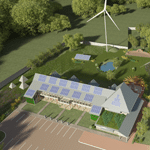After learning that their vacation property near Lake Geneva, Wisconsin, was targeted for a four-lane highway as part of a commercial corridor, Fritz Kreiss and his wife Catherine McQueen made a life change to save their land. McQueen had always wanted to open a bed and breakfast, and Kreiss was an energy aggregator; he had made a career of assisting various entities finance renewable energy and sustainable construction.
The marriage of those interests produced the idea behind the Green Leaf Inn. The project, a 19-suite hotel complex with a retrofit of the existing home along with a new building, is on target to be net zero energy, making it the first hotel in the country to achieve that status, Kreiss says.
Working with Anderson Ashton Design/Build, Kreiss plans to incorporate a comprehensive collection of features that will wipe out the complex’s reliance on nonrenewable energy. The property will use photovoltaics, a wind turbine, three different solar-thermal systems, a micro-CHP, and a geothermal heat pump. “For me,” Kreiss says, “it’s kind of like a kid playing in a toolbox.”
Details
Location Delavan, WI
Completed Fall 2013 (expected)
Size 16,000 sq ft
Client Green Leaf Inn
Architect Anderson Ashton Design/Build
General Contractor Anderson Ashton-Design/Build
MEP Engineer The Matrix Group Engineers
By showcasing these environmentally conscious technologies, the Green Leaf Inn will inform a wide variety of audiences, from guests to local government officials, on possible strategies for reducing energy consumption. Additionally, outcomes will be monitored to ensure that the systems are functioning as expected. “The whole concept is going to be educational,” says Brian Fisher, the business development manager for Anderson Ashton. “They want it to be a learning facility in addition to being net zero.”
As Fisher points out, Kreiss will recoup an up-front expenditure on a metal roof, which is more durable than one made of asphalt shingles. The same is true for the power-generating features.
“The fact that you’re not going to have utility bills is a huge savings,” Fisher says, adding that Anderson Ashton always tries to emphasize that aspect of environmentally friendly products and strategies. “[Clients] love the idea of going green but aren’t as enthusiastic if it means spending a lot of money.”
Anderson Ashton’s orientation has also been an asset to the Green Leaf Inn. “This project really showcases the flexibility of the design/build approach,” Fisher says. “We’ve changed designs on a dime several times.” Kreiss anticipates that the Green Leaf Inn will evolve over time, adding new systems and features as they become available.
Of course, the Green Leaf Inn is first and foremost a hotel and is expected to draw many of its guests from the Chicagoland area who come to Lake Geneva for a convenient getaway.
Although the emphasis is on sustainability, luxury isn’t sacrificed in the process. For example, every room has a hot tub, which doesn’t seem like the most environmentally friendly option, but the water and energy from them is reused. As the water drains, the heat is recaptured through a heat exchanger to preheat domestic water, and the water is then fed into the on-site aerobic wastewater-treatment system, which is also integrated into the geothermal heat-pump system.
The inn will also provide ample marketing for Kreiss’ company, highlighting the possibilities of renewable energy resources. “It’s a sales demonstration,” Kreiss says. “We want it to be a catalog.” The Green Leaf Inn will illustrate how these projects can be cost-effective in the long-term. “It’s not only good for the environment, it’s good for business.”

